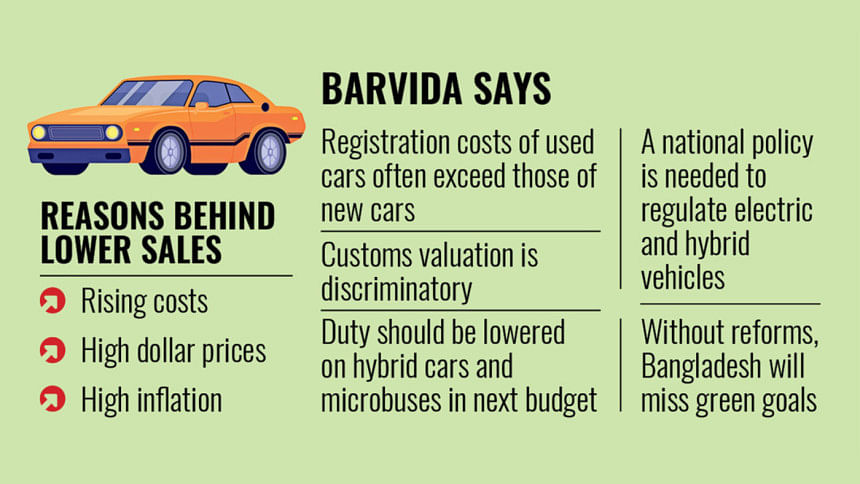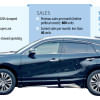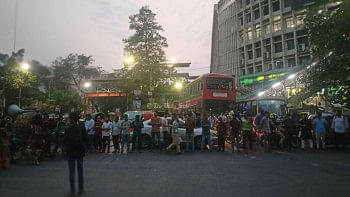Vehicle sales plunged in 2024

The vehicle market in Bangladesh contracted to a 10-year low in 2024 as imports and sales declined sharply due to rising costs, foreign exchange constraints, and people's falling purchasing power, according to industry people.
Citing official statistics, the Bangladesh Reconditioned Vehicles Importers and Dealers Association (Barvida) said around 3.08 lakh units were registered last year.
This marked the steepest decline since the Covid-19 pandemic, when roughly 3.8 lakh vehicles were registered with the Bangladesh Road Transport Authority (BRTA), it added.
"Our business environment has become extremely challenging," said Barvida President Abdul Haque.
"Reconditioned cars historically served the middle class. But with prices soaring and incomes stagnating, affordability has collapsed," he added while pointing out how vehicle imports have shrivelled compared to previous years.
Haque was speaking at a press conference held at the FARS Hotel and Resorts in Paltan, Dhaka yesterday.
Against this backdrop, industry people are calling for urgent policy reforms to revitalise the sector, which annually generates thousands of crores in government revenue and sustains employment for more than one lakh people across showrooms, workshops, dealerships, and ancillary services.
Regarding the reduced sales, Haque said several factors have combined to hit the reconditioned vehicle market hard.
According to him, the foreign currency shortage that began in late 2022 continued to plague the economy throughout 2024, pushing up the cost of imports.
The exchange rate of the Bangladeshi taka against the US dollar and Japanese yen deteriorated at the same time, thereby making imports even costlier.
Also, ongoing inflationary pressure and double-digit interest rates on consumer loans forced middle-class consumers to cut back on major purchases such as cars, Haque said.
"Costs are up everywhere – from shipping and customs duties to showroom maintenance – but consumer budgets have shrunk," he added.
The Barvida chief believes that reconditioned vehicles offer the best value for the country's growing middle-income group by balancing affordability, reliability, and resale value.
However, he said the price gap between new and reconditioned vehicles has narrowed, paradoxically making reconditioned cars more expensive than brand-new models in some cases.
This phenomenon is rooted in discriminatory customs valuation practices. For example, while new car importers benefit from a 20 percent discount on the published yellow book price, reconditioned importers are often denied similar deductions, leading to an artificially inflated tax base.
As a result, middle-income buyers are increasingly opting for cheaper, lower-quality alternatives, including older used cars or inexpensive imports from neighbouring countries, often at the expense of safety and environmental standards.
"We are seeing a concerning rise in the use of low-grade vehicles that could undermine both road safety and Bangladesh's climate goals," Haque said.
Barvida gave some ideas to the interim government to help fix the problem. They want these ideas to be included in the national budget for fiscal year 2025-26.
The most crucial recommendation is to reduce supplementary duties on hybrid vehicles to encourage the transition towards fuel-efficient, eco-friendly cars.
Barvida also suggested fixed duties on microbuses, which are widely used for worker and student transport across the country.
Additionally, the association demanded a comprehensive national policy for electric, hybrid, plug-in hybrid, and hydrogen vehicles, based on participatory discussions involving industry stakeholders.
It also emphasised the growing importance of microbuses for local public and private transport needs.
At the press conference, Haque called for not just tariff reductions but also a broader promotional framework to encourage safe, organised, and affordable transportation options, particularly in peri-urban and rural areas.
Given the widespread deaths from accidents involving unsafe three-wheelers on highways, Barvida urged the interim government to treat microbuses as a national transport priority.
While interest in electric vehicles (EVs) is growing globally, Bangladesh's EV market remains untapped and unregulated, he said.
He informed that without strict standards and quality control, the country could be flooded with substandard EVs, jeopardising consumer confidence in the sector.
As such, Haque stressed that a transparent, participatory regulatory framework is essential to ensure the orderly growth of EV adoption.
He also informed that a major plank of Barvida's proposals for the FY26 national budget is the reduction of supplementary duties on hybrid vehicles.
Haque emphasised that while many countries are slashing duties and offering incentives to accelerate a transition towards green transport, Bangladesh's tariff structure remains outdated and punitive.
He said currently, the supplementary duty rates are based on engine displacement, which fails to account for the fuel-saving and environmental benefits of hybrid technologies. As a result, hybrid vehicles – despite their superior efficiency – are often priced beyond the reach of the middle class.
"Without correcting the duty structure, Bangladesh risks lagging far behind the global movement toward net-zero carbon emissions," Haque said.
Reaz Rahman, secretary general of Barvida, also spoke at the press conference.

 For all latest news, follow The Daily Star's Google News channel.
For all latest news, follow The Daily Star's Google News channel. 





Comments